反义疑问句-感叹句-省略句的讲解及练习题
史上最全最有方法的反义疑问句讲解及练习
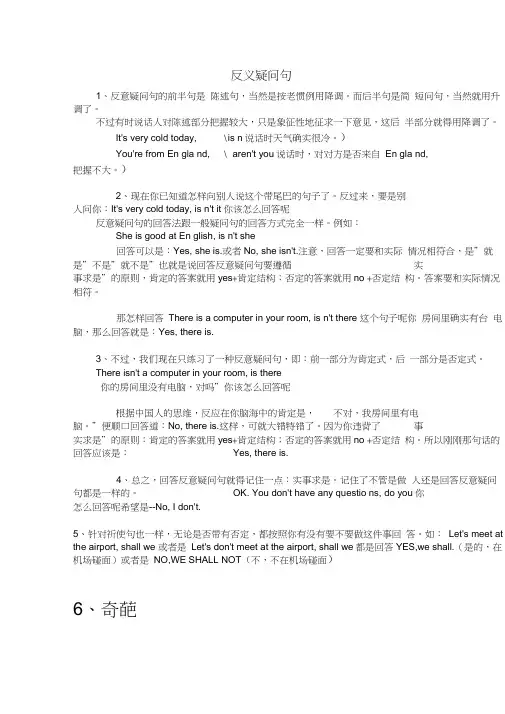
反义疑问句1、反意疑问句的前半句是陈述句,当然是按老惯例用降调。
而后半句是简短问句,当然就用升调了。
不过有时说话人对陈述部分把握较大,只是象征性地征求一下意见,这后半部分就得用降调了。
It's very cold today, \is n说话时天气确实很冷。
)You're from En gla nd, \ aren't you说话时,对对方是否来自En gla nd,把握不大。
)2、现在你已知道怎样向别人说这个带尾巴的句子了。
反过来,要是别人问你:It's very cold today, is n't it你该怎么回答呢反意疑问句的回答法跟一般疑问句的回答方式完全一样。
例如:She is good at En glish, is n't she回答可以是:Yes, she is.或者No, she isn't.注意,回答一定要和实际情况相符合,是”就是”不是”就不是”也就是说回答反意疑问句要遵循实事求是”的原则,肯定的答案就用yes+肯定结构;否定的答案就用no +否定结构。
答案要和实际情况相符。
那怎样回答There is a computer in your room, is n't there 这个句子呢你房间里确实有台电脑,那么回答就是:Yes, there is.3、不过,我们现在只练习了一种反意疑问句,即:前一部分为肯定式,后一部分是否定式。
There isn't a computer in your room, is there你的房间里没有电脑,对吗”你该怎么回答呢根据中国人的思维,反应在你脑海中的肯定是,不对,我房间里有电脑。
”便顺口回答道:No, there is.这样,可就大错特错了。
因为你违背了事实求是”的原则:肯定的答案就用yes+肯定结构;否定的答案就用no +否定结构。
所以刚刚那句话的回答应该是:Yes, there is.4、总之,回答反意疑问句就得记住一点:实事求是。
高中语法省略讲解及练习
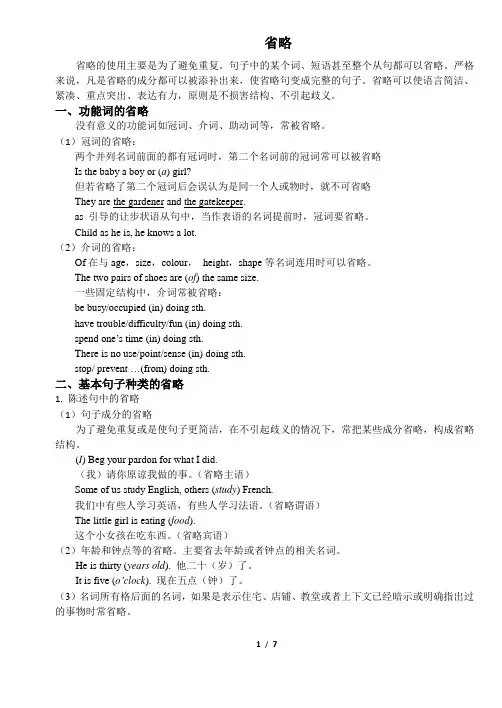
省略省略的使用主要是为了避免重复。
句子中的某个词、短语甚至整个从句都可以省略。
严格来说,凡是省略的成分都可以被添补出来,使省略句变成完整的句子。
省略可以使语言简洁、紧凑、重点突出、表达有力,原则是不损害结构、不引起歧义。
一、功能词的省略没有意义的功能词如冠词、介词、助动词等,常被省略。
(1)冠词的省略:两个并列名词前面的都有冠词时,第二个名词前的冠词常可以被省略Is the baby a boy or (a) girl?但若省略了第二个冠词后会误认为是同一个人或物时,就不可省略They are the gardener and the gatekeeper.as 引导的让步状语从句中,当作表语的名词提前时,冠词要省略。
Child as he is, he knows a lot.(2)介词的省略:Of在与age,size,colour,height,shape等名词连用时可以省略。
The two pairs of shoes are (of) the same size.一些固定结构中,介词常被省略:be busy/occupied (in) doing sth.have trouble/difficulty/fun (in) doing sth.spend one’s time (in) doing sth.There is no use/point/sense (in) doing sth.stop/ prevent …(from) doing sth.二、基本句子种类的省略1. 陈述句中的省略(1)句子成分的省略为了避免重复或是使句子更简洁,在不引起歧义的情况下,常把某些成分省略,构成省略结构。
(I) Beg your pardon for what I did.(我)请你原谅我做的事。
(省略主语)Some of us study English, others (study) French.我们中有些人学习英语,有些人学习法语。
中考英语反义疑问句、感叹句讲解及习题
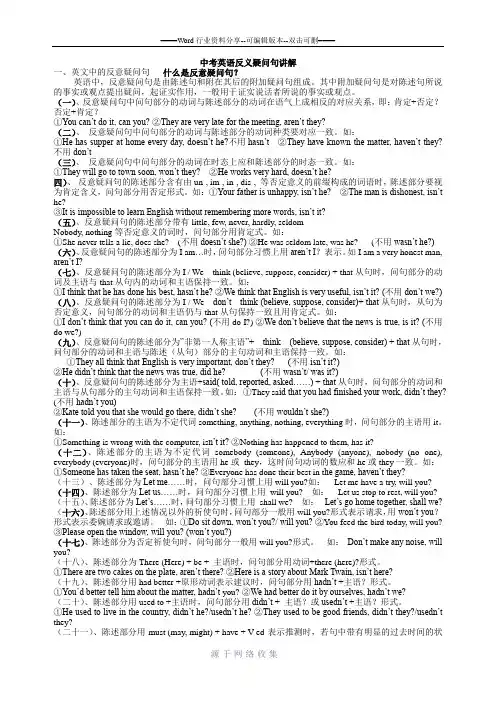
中考英语反义疑问句讲解一、英文中的反意疑问句什么是反意疑问句?英语中,反意疑问句是由陈述句和附在其后的附加疑问句组成。
其中附加疑问句是对陈述句所说的事实或观点提出疑问,起证实作用,一般用于证实说话者所说的事实或观点。
(一)、反意疑问句中问句部分的动词与陈述部分的动词在语气上成相反的对应关系,即:肯定+否定?否定+肯定?①You can’t do it, can you? ②They are very late for the meeting, aren’t they?(二)、反意疑问句中问句部分的动词与陈述部分的动词种类要对应一致。
如:①He has supper at home every day, doesn’t he?不用hasn’t②They have known the matter, haven’t they?不用don’t(三)、反意疑问句中问句部分的动词在时态上应和陈述部分的时态一致。
如:①They will go to town soon, won’t they? ②He works very hard, doesn’t he?四)、反意疑问句的陈述部分含有由un-, im-, in-, dis-, 等否定意义的前缀构成的词语时,陈述部分要视为肯定含义,问句部分用否定形式。
如:①Your father is unhappy, isn’t he? ②The man is dishonest, isn’t he?③It is impossible to learn English without remembering more words, isn’t it?(五)、反意疑问句的陈述部分带有little, few, never, hardly, seldomNobody, nothing等否定意义的词时,问句部分用肯定式。
如:①She never tells a lie, does she? (不用doesn’t she?)②He was seldom late, was he? (不用wasn’t he?) (六)、反意疑问句的陈述部分为I am…时,问句部分习惯上用aren’t I?表示。
反义疑问句详细讲解及习题及答案精编版
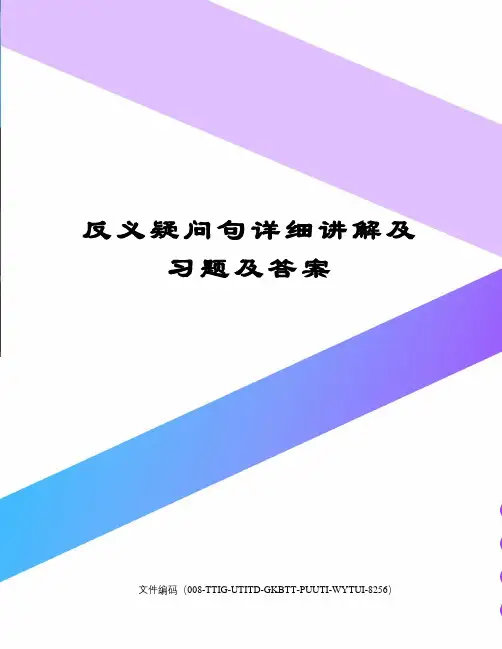
反义疑问句详细讲解及习题及答案文件编码(008-TTIG-UTITD-GKBTT-PUUTI-WYTUI-8256)反义疑问句一.句型解释反义疑问句(The Disjunctive Question):即附加疑问句。
它表示提问人的看法,没有把握,需要对方证实。
反义疑问句由两部分组成:前一部分是一个陈述句,后一部分是一个简短的疑问句,两部分的人称时态应保持一致。
1.陈述部分肯定式+疑问部分否定式2.陈述部分否定式+疑问部分肯定式She was ill yesterday, wasn’t sheYou didn’t go, did you二.特殊的句型1.祈使句。
祈使句后一般加上will you或won't you构成反意疑问句,用will you 多表示“请求”,用won't you 多表示提醒对方注意。
例如:Let引导的祈使句有两种情况:1) Let's...,后的反意疑问句用shall we或shan't we。
例如:Let's go home, shall we/ shan't we 回家吧,好吗2)Let us/me...后的反意疑问句用will you或won't you。
例如:Let me have a try, will you/won't you3)祈使句都用will you 或won’t you2.当陈述部分含I think (believe, suppose...)that... 结构时,其反意疑问句须与从句的主、谓语保持一致,注意主句的主语必须是第一人称。
例如: I don't think he will come, will he若是非第一人称,则与主句的主语相一致He thinks that she will come, doesn’t he反意疑问句的陈述部分为I(We) don’t think(believe, suppose, consider)+ that从句时,从句为否定意义,问句部分的动词和主语仍与that从句保持一致且用肯定式。
反义疑问句讲解及练习题
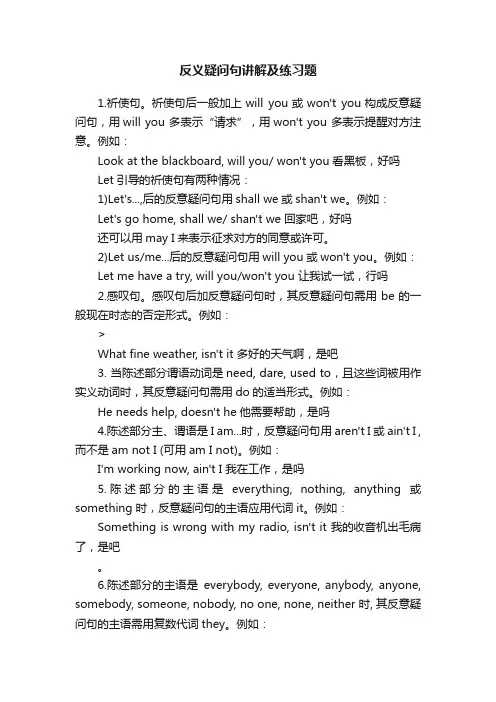
反义疑问句讲解及练习题1.祈使句。
祈使句后一般加上will you或won't you构成反意疑问句,用will you 多表示“请求”,用won't you 多表示提醒对方注意。
例如:Look at the blackboard, will you/ won't you看黑板,好吗Let引导的祈使句有两种情况:1)Let's...,后的反意疑问句用shall we或shan't we。
例如:Let's go home, shall we/ shan't we 回家吧,好吗还可以用may I来表示征求对方的同意或许可。
2)Let us/me...后的反意疑问句用will you或won't you。
例如:Let me have a try, will you/won't you 让我试一试,行吗2.感叹句。
感叹句后加反意疑问句时,其反意疑问句需用be的一般现在时态的否定形式。
例如:>What fine weather, isn't it 多好的天气啊,是吧3. 当陈述部分谓语动词是need, dare, used to,且这些词被用作实义动词时,其反意疑问句需用do的适当形式。
例如:He needs help, doesn't he他需要帮助,是吗4.陈述部分主、谓语是I am...时,反意疑问句用aren't I 或ain't I ,而不是am not I (可用am I not)。
例如:I'm working now, ain't I 我在工作,是吗5.陈述部分的主语是everything, nothing, anything或something 时,反意疑问句的主语应用代词it。
例如:Something is wrong with my radio, isn't it 我的收音机出毛病了,是吧。
反义疑问句讲解与练习
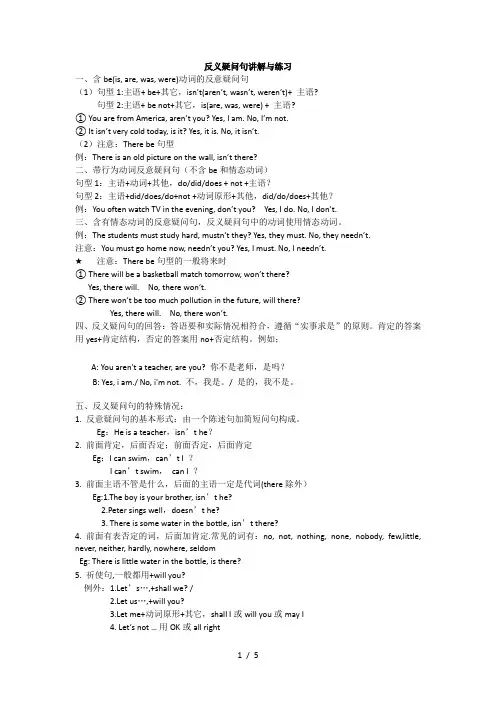
反义疑问句讲解与练习一、含be(is, are, was, were)动词的反意疑问句(1)句型1:主语+ be+其它,isn’t(aren’t, wasn’t, weren’t)+ 主语?句型2:主语+ be not+其它,is(are, was, were) + 主语?① You are from America, aren’t you? Yes, I am. No, I’m not.② It isn’t very cold today, is it? Yes, it is. No,it isn’t.(2)注意:There be句型例:There is an old picture on the wall, isn’t there?二、带行为动词反意疑问句(不含be和情态动词)句型1:主语+动词+其他,do/did/does + not +主语?句型2:主语+did/does/do+not +动词原形+其他,did/do/does+其他?例:You often watch TV in the evening, don’t you? Yes, I do. No, I don’t.三、含有情态动词的反意疑问句,反义疑问句中的动词使用情态动词。
例:The students must study hard, mustn’t they? Yes, they must. No, they needn’t.注意:You must go home now, needn’t you? Yes, I must. No, I needn’t.★注意:There be句型的一般将来时① There will be a basketball match tomorrow, won’t there?Yes, there will. No, there won’t.② There won’t be too much pollution in the future, will there?Yes, there will. No, there won’t.四、反义疑问句的回答:答语要和实际情况相符合,遵循“实事求是”的原则。
高考英语一轮复习——专题十六:省略和反意疑问句及感叹句
[ 典例 ]
(2012· 新课标全国卷 )Film has a much shorter
history, especially when ________ such art forms as music and painting. A.having compared to C.compare to B.comparing to D.compared to
②—Will you join in the game? —I'd be glad to. ——你愿意参加这个比赛吗? ——我愿意。
③—Are you a sailor? —No, but I used to be. ——你是水手吗? ——不是,但我过去是。
④—He hasn't finished yet. —Well, he ought to have. ——他还没完成。 ——哦,他早该完成了。
⑥—Do you think it will rain? —I hope so/not (that it will rain/not rain). ——你认为会下雨吗? ——我希望下/不下。
[规律总结]
1.当状语从句的主语和主句的主语一致或主语是it,且 从句中含be动词时,可以省略状语从句中的主语和be动词。
2.so或not代替上文内容,此时可用“if+so/not”省略 句式。
3.I'm afraid, I think, I believe, I hope, I guess等作答 句,后面跟so与not分别表示肯定或否定,宾语从句可省去。
二、不定式的省略
①I asked him to see the film, but he didn't want to. 我叫他去看电影,但是他不想去。
(完整版)初中英语反义疑问句讲解_练习及答案
反义疑问句(一)见解:反意疑问句是由陈述句和附在以后的附加疑问句组成。
其中附加疑问句是对陈述句所说的事实或见解提出疑问,起证明作用,一般用于证明说话者所说的事实或见解。
(二)要点注意:1、反意疑问句前后两部分谓语应是:“必定陈述+否定疑问”或“否定陈述+必定疑问”。
2、简单问句若是可否定式:not 应与 be, do, will 等系动词、助动词、神情动词缩写。
3、简单问句的主语不用名词,应用人称代词。
4、陈述部分含“ too...to时,”可否定句。
(三)用法:1) 陈述部分I am 时,疑问部分要用aren't I.I'm as tall as your sister , aren't I?(我和你姐姐相同高,对吗?)2) 陈述部分用 no, nothing, nobody, never, few, little, seldom, hardly 等否定含义的词时,疑问部分用必定含义。
如: The old man made no answer, did he?Jim is never late for school, is he?3) 陈述部分有have to +v. (had to + v.) ,疑问部分常用don't +主语( didn't + 主语)。
We have to get there at eight tomorrow, don't we?4) 陈述部分的谓语是used to 时,疑问部分用didn't + 主语或usedn't +主语。
He used to take pictures there, didn't he? / usedn't he?5)陈述部分有 had better(最好) + v. 疑问句部分用 hadn't you? You'dbetter read it by yourself, hadn't you?6) 陈述部分有would rather (宁愿、宁愿)+v. ,疑问部分多用wouldn't + 主语。
反义疑问句-感叹句-省略句的讲解及练习题
反义疑问句-感叹句-省略句的讲解及练习题反义疑问句一.“前肯后否,前否后肯”,的形式,动词、时态等相一致,回答反义疑问句时要尊重事实。
*Your sister is not a nurse, she?No,she isn’t.she teaches English in a middle school.动词原形开头 stop talking二.祈使句的反义疑问句Don’t+动词原形Don’t talk.祈使句的反义疑问句一般都用will you,表请求。
Don’t forget to put the book back on the shelf. you?在Let’s中,则用shall we, 注:let’s 不等于let us/let me。
但表示劝诱,邀请时用won’t you;表示提醒对方用can’t you,表示告诉某人做某事。
Stop talking,can you? Have some coffee,won’t you?三.?当陈述部分主语是that/everything/something/nothing/anything等不定代词时,反义疑问句部分用it.当陈述部分主语是these/those/anyone/somebody/everybody/noone/nobody时,反义疑问部分用they,正式用he.Everything is arranged in a good order,isn’t it?四.当陈述部分是I think/suppose/believe/imagine/expect that...时,同末反义疑问句部分与宾语从句保持一致。
I don’t think he will arrive here in time,will he?五.?I wish结构中,反义疑问句部分用肯定形式may I.当陈述部分是”I am”时,反义疑问句用aren’t I. I am your student,aren’t I?但反义疑问句部分表肯定时。
(完整版)高考英语反意疑问句讲解及练习
反意疑问句一、见解反义疑问句 (The Disjunctive Question)即附加疑问句,反意疑问句是疑问句的一种,是对陈述句所说的事实或见解提出疑问,起证明作用,一般用于证实说话者所说的事实或见解。
反意疑问句是由陈述句和附在以后的附加疑问句组成。
结构有以下两种:1.陈述部分必定式 +疑问部分否定式2.陈述部分否定式 +疑问部分必定式即:前肯后否,前否后肯。
反义疑问部分用助动词或神情动词或be 动词+名词或代词(主格)。
如: They work hare, don’t they?She was ill yesterday, wasn’t she?You didn ’t go, did you?He can’t ride a bike, can he?二、反义疑问句的用法1. 陈述部分主语是I 的必定形式时,疑问部分要用aren ’t I.如: I ’m as tall as your sister,aren’t I?2.陈述部分含有否定词或半否定词,以及含有由否定意义的词的反意疑问句当陈述部分有 never ,seldom, hardly ,few,little ,barely, scarcely, nothing ,nobody 等否定词或半否定词时,反意疑问部分用必定形式。
否定前缀不能够视为否定词,其反意疑问句仍用否定形式。
如: There are few apples in the basket, are there?He can hardly swim, can he?They seldom come late, do they?It is impossible, isn't it?He is not unkind to his classmates, is he?3、含有宾语从句的反意疑问句当陈述部分是一个(带that引导宾语从句的)主从复合句时,附加疑问句的主谓要和主句的主谓保持对应关系。
- 1、下载文档前请自行甄别文档内容的完整性,平台不提供额外的编辑、内容补充、找答案等附加服务。
- 2、"仅部分预览"的文档,不可在线预览部分如存在完整性等问题,可反馈申请退款(可完整预览的文档不适用该条件!)。
- 3、如文档侵犯您的权益,请联系客服反馈,我们会尽快为您处理(人工客服工作时间:9:00-18:30)。
反义疑问句一.“前肯后否,前否后肯”,的形式,动词、时态等相一致,回答反义疑问句时要尊重事实。
*Your sister is not a nurse, she?No,she isn’t.she teaches English in a middle school.动词原形开头 stop talking二.祈使句的反义疑问句Don’t+动词原形 Don’t talk.❶祈使句的反义疑问句一般都用will you,表请求。
Don’t forget to put the book back on the shelf. you?❷在Let’s中,则用shall we, 注:let’s 不等于let us/let me。
但表示劝诱,邀请时用won’t you;表示提醒对方用can’t you,表示告诉某人做某事。
Stop talking,can you? Have some coffee,won’t you?三.❶当陈述部分主语是that/everything/something/nothing/anything等不定代词时,反义疑问句部分用it.❷当陈述部分主语是these/those/anyone/somebody/everybody/noone/nobody时,反义疑问部分用they,正式用he.Everything is arranged in a good order,isn’t it?四.当陈述部分是I think/suppose/believe/imagine/expect that...时,同末反义疑问句部分与宾语从句保持一致。
I don’t think he will arrive here in time,will he?五.❶I wish结构中,反义疑问句部分用肯定形式may I.❷当陈述部分是”I am”时,反义疑问句用aren’t I. I am your student,aren’t I?但反义疑问句部分表肯定时。
可用am I. I am not your student,am I? 六.在含有情态动词的反义疑问句中。
❶反义疑问句部分一般不用mayn’t,常用mightn’t或can’t代替,表将来还可用won’t. They may be here next week,mightn’t they/won’t they?❷在带有had better/would better/would sooner/would as soon/would like等句子中,反义疑问部分以had/would为助动词。
We had better go,hadn’t we?You’d rather stay here alone.wouldn’t you?❸dare和need在行为动词和情态动词中,有不同的反问.He dares to escape,doesn’t he?/He dare not escape,dare he?❹在ought to中,一般用shouldn’t. We ought to go now,shouldn’t we?❺must+be对现在推测,当一般时或进行时.You must be hungry,aren’t you?must+have done推测过去持续到现在,按完成体处理。
E.g:You must have studied English four years,haven’t you?must+have done表对过去推测,当做一般过去时反义疑问句处理。
E.g:You must have come last week,didn’t you?七.特殊用法❶带有推断和感叹语气的句子中。
So that’s your little game.isn’t it?表讽刺,怀疑。
❷并列复合句中,谓语动词跟临近的保持一致。
He is a professor,but his lady is an actor,isn’t she?❸陈述部分是不定式或动名词短语。
疑问部分用it.Swimming is great fun,isn’t it?❹none of+不可数名词,用it;加可数,根据情况选用they,you/are.❺陈述部分是疑问否定词的前缀或后缀构成的,其附加仍用否定。
It’s unfair,isn’t it? You are hopeless, aren’t you?附加:①One can’t be too careful,can you(非正式)/can one(正式)?②当陈述部分为there be时,反义疑问部分也用there.There used to be a petrol station near the park,didn’t there?反义疑问句20道题参考答案1. D2. A3. B4. D5.B6.C7.D8.D9.C 10.A 11.C 12.B13. C 14.A 15.A 16. D 17. A 18. B 19. C 20. A反义疑问句练习题1. If you don’t go, _____.A. so do IB. so will IC. nor do ID. neither shall I2. It was Mr. Smith that you met at the meeting, _________?A. wasn’t it B. was it C. did you D. didn’t you3. Listen! His family must be quarreling, ?A.mustn’t it B.aren’t they C.isn’t it D.needn’t they4. Let's take a walk, ________?A. will youB. don't weC. do weD. shall we5. You must have seen him off yesterday, _________?A. haven't youB. didn't youC. mustn't youD. needn't you6. You must be fifty, ________?A. mustn't youB. needn't youC. aren't youD. mnyn't you7. It’s a fine day, Let’s go fishing, _____?A. won’t weB. will weC. don’t weD. shall we8. Frank is working late again. This is the first time this week he’s had to study late, ____?A. isn’t heB. hasn’t itC. hasn’t heD. isn’t it9. —Daddy’s forgot to post the letter again, ____?—I’m afraid he ___.A. has; hasB. isn’t; isC. hasn’t; hasD. has; hasn’t10. —Sorry, I’m not feeling well and I don’t think I can finish.—Don’t worry. Let us do it for you , ____?A. will youB. shall weC. shan’t weD. shall you11. I don’t think he could have done such a stupid thing last night, ____?A. do IB. could heC. did heD. has he12. —The ground is wet.—It must have rained last night,____ ?A. hasn’t itB. didn’t itC. mustn’t itD. isn’t it13. —Jenny doesn’t think that Robert is honest, ___?—I’m afraid not.A. is heB. isn’t heC. does sheD. doesn’t she14. —The new windows need washing.—Well, let’s wash them together, ____?A. shall weB. will youC. should weD. would you15. There is little we can do about it, ____?A. is thereB. can’t weC. isn’t thereD. can we16. —The problem wasn’t difficult for him, was it ?—______. He should have been given a more difficult one.A. No, it wasB. Yes, it wasC. Yes, it wasn’tD. No, it wasn’t17. Let us take a walk, ________?A. will youB. don't weC. do weD. shall we18. Tom dislike playing tennis, ________?A. does heB.doesn’t heC.is he Disn’t he19. I don't believe he will succeed, _______? A. does he B. doesn’t he C. will he D won’t he 20. He doesn't believe he will succeed, _______? A. does he B. doesn’t he C. will he D won’t he感叹句一.由what开头:what+a(an)+adj+可数名词单数!what+adj+可数名词复数/不可数名词What fine weather it is!二.由how开头:how+adj/adv+主+谓How tall the boy is!三.特殊感叹句在陈述或疑问句后是感叹号。
E.g: Let’s go out for doing sport, sunny day! a.what b.what a c.howgreat process he has made! A.how b.what c.what a感叹句练习题答案一、1.What2.What a,3.H o w,4.How5.What an,6.What,7.What a,8.What,9.H o w,10.How二、B A A C A CACAC三、1.How fast2.How exciting3.How beautiful4.Whatauseful,how useful the感叹句专项练习一、填入适当的词完成下列感叹句。
